Our Work
- Connect SoCal
- Inclusion, Diversity, Equity & Awareness
- Programs & Projects
- Housing
- Economy & Demography
- Federal & State Compliance
- Sustainable Development and Resilient Communities
- Transportation
- Active Transportation
- Planning For Main Streets
- Aviation Program
- Regional Pilot Initiatives Program
- Future Communities Pilot Program
- Transportation Demand Management
- Transit Program
- FreightWorks
- Passenger Rail Program
- Corridor Planning
- Transportation Safety
- Transportation Finance
- Intelligent Transportation Systems
- Southern California Transportation Study
- LA28 Games Mobility Program
- Local Resources
- Funding & Programming
- Legislation & Advocacy
- Publications & Reports
Publications & Reports
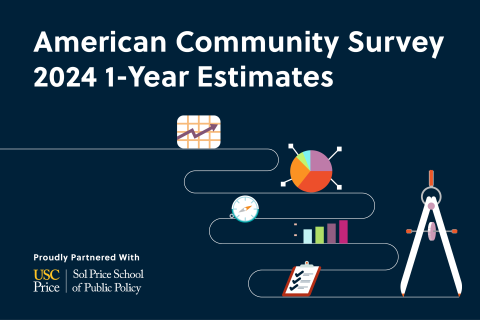
SCAG has published a new demographic analysis based on the U.S. Census Bureau’s 2024 American Community Survey (ACS) one-year estimates: “Highs, Lows, and Shocks: Key Housing and Economic Trends in Southern California.” Published during the 2025 Southern California Demographic Workshop, hosted by SCAG and the USC Sol Price School of Public Policy on Oct. 1, the report uses ACS data to compare trends in the region to California and the United States across a range of housing and economic topics.
Drawing on nearly two decades of annual ACS data, the report highlights how the SCAG region and its six counties compare with state and national trends across key indicators such as housing affordability, workforce patterns, and economic resilience.
Download Highs, Lows, and Shocks: Key Housing and Economic Trends in Southern California.

The “2024-25 President’s Report” provides a detailed account of SCAG’s accomplishments during Sup. Curt Hagman's (San Bernardino County) tenure as Regional Council president, from May 2024 to May 2025. During his time as the president of the SCAG Regional Council, Hagman prioritized the role of technology in goods movement, clean transportation, and transit recovery. The “2024-25 President’s Report” provides a comprehensive overview of SCAG’s numerous activities in these areas as well as the advocacy accomplishments and awards of SCAG and its partners during that time.
Download the “2024-25 President’s Report.”
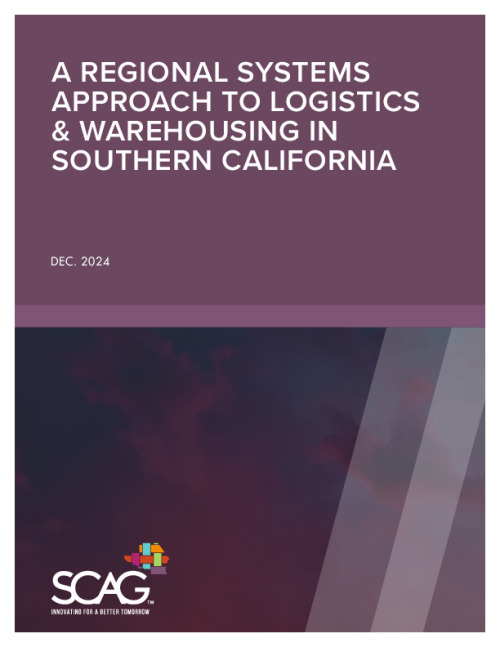
The growth and evolution of industrial facilities supporting distribution and consumption is increasingly impacting the SCAG region’s growth and changes in its urban and suburban environments. The primary purpose of this whitepaper is to identify why a regional systems-based approach to industrial development is necessary and to guide the SCAG region toward a regional systems-based approach. A regional approach to industrial development requires acknowledgment and understanding of the needs of local communities, especially those impacted by industrial activities, while also recognizing the economic benefits and local, regional, state, and national nature of how supply chains are organized and operated.
The whitepaper’s key areas of focus and highlights include interdependency relationships, e-commerce and digital shifts, supply chain considerations, and trucking and industrial development challenges. The whitepaper concludes with recommendations for how SCAG can lead in facilitating greater regional collaboration and providing tools and resources to support local jurisdictions.
Download the Logistics & Warehousing in Southern California Whitepaper.

This report summarizes the accomplishments of SCAG during President Art Brown’s term covering the period 2023-2024. The featured accomplishments highlight the agency’s extensive work to identify and address the needs of the region and promote sustainability, prosperity, and quality of life improvements for all Southern Californians.
Download the President's Report Year in Review 2023-2024.

Clean cities coalitions are required by the U.S. Department of Energy (DOE) to establish and maintain a strategic plan, which serves as a multi-year guideline to identify objectives and activities to achieve specific goals, including a 16 percent increase in gasoline gallon equivalent displaced and a 20 percent yearly reduction in greenhouse gas emissions. This Southern California Clean Cities Strategic Plan addresses the elements requested by DOE additionally, it summarizes the activities of the Southern California Clean Cities Coalition, links to SCAG’s Connect SoCal Regional Transportation Plan/Sustainable Community Strategy (RTP/SCS) and aligns with other regional planning and policy initiatives at SCAG. The Southern California Clean Cities Strategic Plan is intended to span a four-year period (2024- 2028), concurrently with the Connect SoCal update cycle.

Released in conjunction with the 14th Annual Southern California Economic Summit on Dec. 6, 2023, the 2023 “Regional Briefing Book” provides current, detailed data on the state of the Southern California economy, with breakdowns of location-specific data for Imperial County, Los Angeles County, Orange County, Riverside and San Bernardino counties, and Ventura County. The economic news in 2023 is generally good in Southern California—the region continues to avert a long-predicted recession while collectively overcoming numerous economic hurdles. There are reasons to be cautious about the economic growth of the region and its localities in the coming year, however.
View the 2023 Regional Briefing Book here.

The SCAG Clean Technology Compendium provides resources and information for local planners and other stakeholders, public or private, working to transition Southern California’s transportation sector to a new generation of clean technologies. By providing an in-depth overview of zero- and near-zero-emission transportation technologies for cars, trucks, buses, trains and bikes, along with charging and fueling infrastructure and other supporting products, the clean transportation technologies explained in the Clean Technology Compendium can immediately improve air quality and reduce the negative public health outcomes throughout the region.
Read the Clean Technology Compendium.
Read the Clean Technology Compendium Factsheet.

The Climate Equity Compendium provides resources for local planners in the SCAG region to advocate for and implement equitable and actionable solutions for their jurisdictions’ climate adaptation efforts. SCAG developed the Compendium in partnership with more than 60 local jurisdictions, focusing on the major concerns of climate adaptation for local agencies: providing resources to assist with staff and funding shortages, removing barriers to relevant data and resources and overcoming the challenges of effective, equitable outreach. SCAG will continue to update the Climate Equity Compendium as the challenges of climate equity evolve.
Read the Climate Equity Compendium

The extent of the changes brought on by the COVID-19 pandemic are still becoming clear. This report examines new data from the American Community Survey to provide insights into how demographic, economic and housing trends in Southern California have changed between 2019 and 2022—and what has stayed the same.
This report compares several topics in demographic, economic and housing conditions across the United States, California, the SCAG region, and each of its six counties. The topics include:
- Demographic and socioeconomic characteristics
- Labor force participation and self-employment
- Commute mode, including work-from-home
- Geographic mobility
- Housing cost burden, tenure and crowding
- Healthcare coverage and broadband access
This report compares the newest available data, from 2022, against both 2021 and pre-pandemic levels; it also includes data from 2006 and 2012 to assess longer-term change.
Download the American Community Survey Data Release report.
An Assessment of the City of Los Angeles
SCAG and California State Polytechnic University, Pomona’s Urban Planning Department collaboratively published a peer-reviewed paper in the renowned Journal of Housing and the Built Environment highlighting the Accessory Dwelling Unit (ADU) Potential project. The paper investigates the impact of Los Angeles’ ADU ordinance on property and neighborhood characteristics in relation to ADU development. Multilevel, logistic, regression models reveal that the ordinance has diversified the types and locations of ADU construction, which ultimately reduces the influence of pre-existing property characteristics. The paper suggests that the ordinance likely attracted ADU development in areas with better bus transit accessibility. These findings offer valuable insights for jurisdictions seeking to create effective policies to support ADU development.
Read the full paper.

The SCAG region includes the Port of Los Angeles and the Port of Long Beach comprising the largest port complex in the Western Hemisphere driving substantial volumes of imports and exports. The region also includes the two largest Class I railroads in North America, BNSF Railway Co. and Union Pacific Railroad Corporation, which facilitate the movement of goods for local and national consumption. Both the rail and port systems are supported by extensive intermodal facilities, freight corridors and access roads, that connect with the largest industrial warehouse and distribution cluster in the United States. At the same time, the SCAG region provides an extensive commuter passenger rail system.
The SCAG Integrated Passenger and Freight Rail Forecast Study served as an initial approach for the region to assess freight and passenger rail in a comprehensive manner. The study evaluated existing and future rail volumes, identified infrastructure needs and prepared a strategic vision for implementation strategies in the region. The study was developed during the COVID- 19 pandemic and considered current assumptions about rail shipments and passenger service levels. The study provides recommendations on service expansion and capital improvements and serves as a resource to position the region for rail-related funding opportunities, aligning with core principles of SCAG’s Goods Movement Resolution.
Download the Integrated Passenger and Freight Rail Forecast Study report.

This report summarizes the accomplishments of SCAG during President Jan Harnik’s term covering the period 2022-2023. The featured accomplishments highlight the agency’s extensive work to identify and address the needs of the region and promote sustainability, prosperity, and quality of life improvements for all Southern Californians.
Download the President's Report Year in Review 2022-2023.

The SCAG region has ambitious goals to reduce greenhouse gas emissions (GHG) in transportation, the number one cause of climate change, in part, by reducing single-occupancy vehicle trips and increasing transit mode share. A key step toward meeting these goals, as well as local and county goals for mobility and equity, can come from improving the speed and reliability of transit services throughout the region.
The Regional Dedicated Transit Lanes Study explored the opportunities, needs, challenges, and best practices for developing a regional network of dedicated bus lanes and other transit priority treatments. This regional transit priority network is intended to enable enhanced transit services, improved mobility, accessibility and sustainability, and advance implementation of Connect SoCal.
Download the Regional Dedicated Transit Lanes Study report.
This research comprehensively examines the capacity of Accessory Dwelling Unit (ADU) development regarding ADU implementation in the Southern California Association of Governments (SCAG) region by conducting a series of analyses at the local and regional levels. This research focuses on the eligibility of parcels for developing detached ADU and excludes Junior ADU (JADU), garage conversions, and non-conforming ADUs.
View the ADU Final Report

Released in conjunction with the 13th Annual Southern California Economic Summit, held on Dec. 1, 2022, this year’s Regional Briefing Book provides an overview of the SCAG region economy today, as well as an outlook for the counties.
As 2022 draws to a close, the SCAG region, composed of Imperial, Los Angeles, Orange, Riverside, San Bernardino and Ventura Counties, is in a post-pandemic recovery, with business activity and labor markets rebooting as the COVID-19 pandemic subsides. In 2022, the SCAG region saw significant growth in employment, income, tourism, home building, infrastructure and new development. The region’s labor markets are booming, ending the year with unemployment at historical lows. However, the region, as much of the world, faces economic and political uncertainty and high inflation, with annual inflation at 7.9 percent in Southern California as of September.
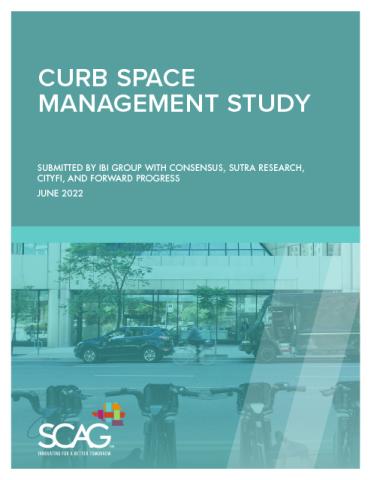
The primary purpose of the Curb Space Management Study (CSMS) has been to take a comprehensive and multimodal review of congested and complicated curb space locations within the SCAG region. With a need for improved mobility, reduced congestion and vehicle miles travelled (VMT)/vehicle hours travelled (VHT), and air quality benefits such as Greenhouse Gas (GHG) emissions, and now COVID-related impacts being critical to the region and its localities, a clear need exists to assess policies, strategies, and infrastructure investments, and their impacts on curb space activity.
The CSMS was a regional level collaborative effort divided into three parts:
- Engagement: Outreach, participation and engagement with local jurisdictions, other agencies, education institutes, private stakeholders, community-based organizations, and communities;
- Assessment: Understanding the needs of the region through multiple cities in terms of curb space; and
- Policy & Strategies Consideration: Provide regional resources to support member agency curb space management interests/needs and insights on strategies related to curb space management.
The study provides SCAG and its member cities with all the tools and direction needed to implement a successful curbside management program in form of a toolkit. To further guide decision-makers, a workplan template and accompanying step-by-step guidance was developed to help any city in the Region design, implement, and evaluate a curb space pilot.
Download the Curb Space Management Study report.
A First Look at Post-COVID Southern California

The COVID-19 pandemic not only impacted trends, it impacted the ability to generate data. The venerable American Community Survey’s 2020 1-year estimates were severely pared down due to sampling challenges, meaning that it was only possible to get state-level data on a limited set of topics. Until release American Community Survey’s 2020 1-year estimates, the only available Census 2020 data product is the so-called PL-94 file used for congressional redistricting, which lacks core details such as age.
This report takes a look at this newly released 2021 ACS 1-year data with an eye on economic and demographic changes observed in the SCAG region. It highlights the differences between 2019 and 2021 in order to compare pre- and post-pandemic.
Download the American Community Survey 2021 1-Year Estimates: A First Look at Post-COVID Southern California report.

The Southern California Association of Governments (SCAG) prepared its first Regional Express Lane Network Concept of Operations (ConOps) document in 2016 as part of its Express Travel Choices Study. The study featured a stakeholder-led process that identified the regional express lane network to be implemented in three tiers over a 30-year period.
The ConOps provide a blueprint for integrating individual express lane projects into a regional system by identifying a comprehensive set of issues that should be addressed as individual express lane projects advanced. Through ongoing meetings, the stakeholders vetted each of these issues to formulate a set of technical policy recommendations to serve as a framework for establishing consistent and/or compatible operating, design, and policy rules for the regional network.
Read the full SCAG Region Value Pricing— Regional Express Lane Network: Concept of Operations
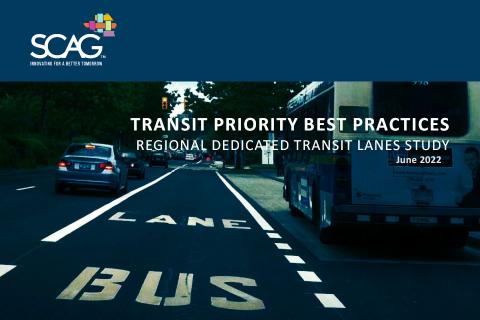
As part of the metropolitan planning efforts, SCAG is conducting a Regional Dedicated Transit Lanes Study to explore the opportunities, needs, challenges, and best practices for developing a regional network of dedicated bus lanes and other transit priority treatments that would enable enhanced transit services, improve mobility, accessibility and sustainability, and advance implementation of Connect SoCal, the 2020-2045 Regional Transportation Plan/Sustainable Communities Strategy. This toolkit of potential priority treatments and supportive policies, tools, and practices, is meant to be tailored to a variety of local needs and constraints in Southern California communities.
Read the full Transit Priority Best Practices Report

Connect SoCal, the 2020-2045 Regional Transportation Plan/Sustainable Communities Strategy identified Key Connections that lie at the intersection of land use, transportation and innovation, meant to advance policy discussions and strategies to leverage new technologies and create better partnerships to increase progress on the regional goals. One of the Key Connections is shared mobility and MaaS, emphasizing that the future of travel will be shaped by technology and the ability of residents to easily choose from and use a variety of travel options.
MaaS integrates transportation services into a single mobility platform that provides competitive alternatives over private vehicles, to promote universal basic mobility, encourage mode shift, and foster sustainable travel choices. This White Paper identified the key policy issues and building blocks for MaaS, and the critical steps that will advance the region towards a truly integrated transportation system. The findings and recommendations set the stage for policy discussions for the 2024 Connect SoCal update.
Read the full MaaS Feasibility White Paper Final Report
Mobility As A Service Feasibility In The SCAG Region Storymap

In February and March of 2022, twenty representatives from SCAG, including sixteen members of the SCAG Regional Council, participated in the SwissCal Conference on the Swiss Public Transportation Ecosystem. The goal of the virtual conference, which connected senior leaders and professionals from across California with senior Swiss transit experts, was to learn about Swiss best practices associated with transit coordination that could be applied in Southern California. The virtual conference was organized by non-profit Seamless Bay Area, and included three other co-hosting partners: LA Metro, Stanford University Bill Lane Center for the American West, and Caltrans.
SCAG participants participated in a two hour follow-up workshop to reflect upon lessons learned and develop a set of actions to advance improved coordination within the next 1-2 years.
View the full SwissCal Final Report

This report summarizes the accomplishments of SCAG during President Clint Lorimore’s term covering the period 2021-2022. The featured accomplishments highlight the agency’s extensive work to identify and address the needs of the region and promote sustainability, prosperity, and quality of life improvements for all Southern Californians.
Download the President's Report - Year in Review: 2021-2022.

Mobility Innovations and Pricing (MIP) is SCAG’s first study to emerge from the diversity, equity, and inclusion initiatives the organization has instituted during the past 18 months. This report focuses on the potential equity implications of road pricing and other innovative transportation policies in the six-county SCAG region. The initiative combines stakeholder engagement, technical analyses, and communications strategies to elevate equity considerations as a key touchstone in planning for road pricing—most critically leading with the concerns of underrepresented communities through dialogue with community stakeholder organizations.
The MIP initiative aims to surface the priorities of historically marginalized populations that disproportionately bear the negative economic, environmental, personal safety, and public health impacts of our transportation system. In addition to identifying transportation burdens and priority investments through a community-led engagement process, the project sought to analyze the travel needs of underrepresented communities. The project serves as foundational step towards understanding the equity implications of these strategies and increasing community participation in the policymaking process on these issues.
For a more in-depth look into the community engagement process, technical analysis, and recommendations, please see the full report available below.
Download the Mobility Innovations & Pricing Report.
A First Look at 2016-2020

After delays due to the pandemic’s impact on survey response rates, the U.S. Census Bureau released the long-awaited American Community Survey (ACS) 2016-2020 5-Year sample on March 17, 2022. While the release is the first to include survey results from 2020, SCAG is not expecting to get complete 1-year data for 2020. Only select data sets are available, and none are available for geographies smaller than states.
This release provides an opportunity to compare 15 years’ worth of ACS data using 5-year samples since the ACS’s inception in 2006. Samples are now available which cover 2006-2010, 2011-2015, and 2016-2020. In effect, these data sets compare the most recently available data (i.e., late 2010s) to conditions five years prior (i.e., early 2010s) and ten years prior (i.e., late 2000s).
Download the American Community Survey Data in Southern California: A First Look at 2016-2020 report.
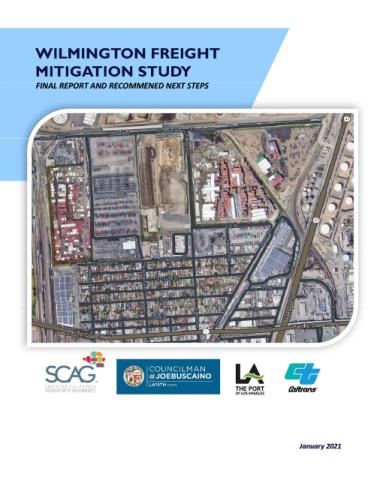
SCAG, in collaboration with the City of Los Angeles, Port of Los Angeles, and Caltrans, commissioned this transportation planning study to achieve two primary objectives: (1) assess the impacts of increased truck travel on a disadvantaged community in the Wilmington area of Los Angeles and (2) recommend both traffic and general land use mitigations to improve the quality of life for residents in this community.
The Wilmington Freight Mitigation Study focused on the traffic impacts associated with the permanent closure of two private railroad crossings at Lomita Boulevard between Eubank Avenue and Alameda Street in the City of Wilmington, California. The study area, bounded by Lomita Boulevard to the north, Drumm Avenue to the east, Pacific Coast Highway to the south, and Sanford Avenue to the west, already experiences high truck traffic due to the surrounding industrial land uses and proximity to the Ports of Los Angeles and Long Beach. The closure of the rail crossings potentially further exacerbates this condition by changing the truck travel patterns from a direct connection to Lomita from Alameda to various alternative routes.
For a more in-depth look into what drove the study process and exactly how it was developed, please see the full report available below.
Read the full Wilmington Freight Mitigation Study
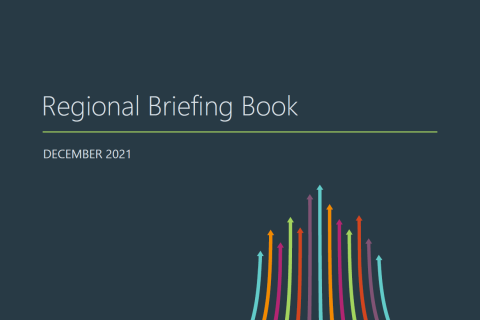
Released in conjunction with the 12th Annual Southern California Economic Summit, held virtually on Dec. 2, 2021, this year’s Regional Briefing Book provides an overview of the SCAG region economy today, as well as an outlook for the counties. There is also an assessment and discussion on incorporating equity in SCAG’s long-term planning, as well as preliminary research into what drives good jobs in U.S. regions to help develop measures and strategies to promote good jobs in Southern California.

This report summarizes the accomplishments of SCAG during President Rex Richardson’s term covering the period 2020-2021. The featured accomplishments highlight the agency’s extensive work to identify and address the needs of the region and promote sustainability, prosperity, and quality of life improvements for all Southern Californians.
Download the President's Report - Year in Review: 2020-2021.

In July 2020, SCAG’s Regional Council made a commitment to advancing justice, equity, diversity, and inclusion throughout Southern California. For the region to become healthy, livable, sustainable, and economically resilient, SCAG needs to dramatically improve outcomes for low-income families and people of color. To that end, SCAG’s core function, its planning work, must directly address the long‐standing systemic and institutional barriers that have fostered inequities in health, wealth, and opportunities. SCAG staff are developing an Early Action Plan to help facilitate the consistent integration of equity into its planning work. The purpose of this report is to highlight past transportation and housing policies and practices that yielded the inequitable conditions that exist today and provide a preliminary baseline assessment of racial equity in Southern California to inform future planning. These inequitable conditions fall into categories aligned with the goals of SCAG’s long-range plan, Connect SoCal: economy, healthy/complete communities, mobility, and environment.
Download the Racial Equity: Baseline Conditions Report (March 24, 2021 Revision).

In January 2021, SCAG presented at the Transportation Research Board’s (TRB) 100th Annual Meeting. This annual conference organizes a program that includes workshops, committee meetings, and exhibits, attracting transportation professionals from around the world. Typically held in Washington, DC, this convening was held as a virtual event amid the COVID-19 pandemic. The overall theme of this year’s meeting was “A Century of Progress: Foundation for the Future.”
SCAG presented the following:
- Paths to Clean Vehicle Technology and Alternative Fuels Implementation in San Bernardino County, California – Completed in partnership with the San Bernardino County Transportation Authority (SBCTA) in July 2020, this presentation is one of several ongoing efforts to understand and help facilitate the region’s transition to a cleaner goods movement system. This study had 3 major components: development of a Scenario Analysis Tool, Stakeholder Outreach, and development of an Action Plan for local governments in San Bernardino County. This presentation describes the development and application of the scenario analysis tool that quantifies emissions and cost impacts of alternative paths to clean vehicle and fuel implementation. Five scenarios where different fuels and technologies were phased into the fleet at different rates were compared.
- Disadvantaged Communities Active Transportation Initiative (DCPI) – The DCPI seeks to make active transportation plans and their implementation more assessable to all jurisdictions within the region. This presentation details the development and implementation of the Active Transportation Toolkit pilot, which provides the materials needed to help under-resourced communities envision and implement their own plans for walking and biking with the support of city staff. For this effort, SCAG partnered with community-based organizations in seven disadvantaged communities to engage in community outreach, facilitate capacity-building trainings, and implement demonstration events. This pilot effort will lead to the adoption of seven Active Transportation Plans, and the Toolkit will be released for public use in spring 2021.
- SCAG Go Human 2020: Case Studies in Equity-Centered Strategies using the SCAG Go Human Kit of Parts – The Go Human Kit of Parts program brings a wide range of active transportation interventions to under-resourced communities in the short term, allowing residents to enjoy them and understand their benefits without having to wait many years for full implementation. This presentation reviews the equity considerations of the program and explores how a regional government active transportation program, in the wake of COVID‐19 and global demonstrations for racial justice, can prioritize equity, community‐led strategies and Black, Indigenous and People of Color communities within planning and engagement.
- SCAG Go Human Campaign – SCAG developed and implemented a hyper-targeted, regional marketing and outreach campaign to raise awareness about safety measures to reduce traffic-related deaths and injuries among people who walk and bike in six Southern California counties comprised of 19 million people. SCAG developed the campaign strategy from analysis of the High Injury Network and SB 535 Disadvantaged Communities, as well as from input from the Go Human Steering Committee. In addition to paid physical and digital media, SCAG extended the reach of the campaign through the use of co-branded safety material distributed to local jurisdictions. After the most recent campaign in 2020, the SCAG Go Human Campaign exceeded 1 billion impressions and printed over 25,000 material for local partners. Please visit the SCAG Go Human webpage for more information on the campaign.
- Environmental Justice & Equity: Spatiotemporal Analysis of Jobs Housing Fit in Southern California – Jobs-housing balance has become a major issue in urban and transportation planning and public policy. Among planners and policy makers, the imbalance of jobs and housing is considered as one of the key contributors to traffic congestion and air pollution, and an impediment to environmental justice. On the other hand, a proper balance of housing and jobs can help people to live close to their workplace, thus reducing overall congestion, vehicle miles traveled (VMT), and greenhouse gas (GHG) emissions. As part of the jobs-housing imbalance/mismatch analysis for Connect SoCal, SCAG conducted the analyses of jobs-housing ratio and low-wage jobs-housing fit for Southern California at two scales—jurisdiction and the census tract (roughly equivalent to a neighborhood), based on the JHFIT methodology developed by UC Davis Center for Regional Change.

SCAG’s Economic Summit began in the wake of the Great Recession as a convening to expand the region’s economic base and to determine priorities for the region that help businesses, public agencies, and communities improve economic vitality.
However, 2020 has brought increased recognition that improving economic health and achieving equity will require broader approaches that address social, economic, and environmental factors that influence the economy in the wake of recent events, including those related to the COVID-19 pandemic. Relatedly, there are a growing number of emerging initiatives which provide the building blocks to address systemic institutionalized racial inequities. Many challenges remain to address racial disparity within an inclusive economic development strategy.
This briefing book represents a first step toward a more comprehensive framework for an inclusive economic recovery.
It is comprised of five parts: 1.) State of the SCAG Region Economy & Outlook; 2.) Modeling the Economic Impacts of COVID-19 Through FY 2021; 3.) Centering Racial Equity as a Driver for Economic Recovery; 4.) Conclusions & Next Steps; 5.) Appendix: County Insights
Download the Regional Briefing Book, December 2020

The purpose of the Last-Mile Freight Delivery Study is to increase understanding of last-mile delivery issues for the Southern California Association of Governments (SCAG) and its member cities by examining the relationship between last-mile access conditions, the delivery of goods, and the role of last-mile delivery in the overall transportation system.
The study serves as a foundational approach and assesses the use of curb areas for deliveries, and the magnitude of other curb uses competing for curb space in the study area of the City of Los Angeles. It provides findings based on field data collection, analyses, and stakeholder discussions.
Recommendations are included for blocks in case study areas, pilot project concepts, policy considerations, and a Toolbox of Strategies for cities throughout the SCAG region to utilize when faced with their own unique delivery challenges.
Read the Last-Mile Freight Delivery Study

This report covers the public health ramifications of extreme heat, as well as vulnerabilities, best practices, and policies, plans, and strategies in place in the SCAG region. The report also touches on interventions and strategies, heat response plans and adaptation and mitigation strategies outside of the SCAG region, and recommendations.
Download the Extreme Heat & Public Health Report.

President Rex Richardson introduced his comprehensive work plan for 2020-2021, “Framework for Recovering and Reimagining a Resilient Region.” Intended to be a collaborative and inclusive process, the framework is focused on the implementation of Connect SoCal, promoting housing production, data and information services, and legislative efforts.

The public response to the novel coronavirus (COVID-19) pandemic and the subsequent national, state, county, and local mandatory stay-at-home orders has significantly impacted transportation demand globally, nationally, regionally, and locally. As the largest metropolitan planning organization in the nation, the Southern California Association of Governments (SCAG) is at the forefront of transportation planning and analysis. In order to facilitate regional planning and public awareness, SCAG prepared this document to highlight impacts of the COVID-19 pandemic on transportation activities to date.
Snapshot of COVID-19 Transportation Impacts in the SCAG Region

This white paper provides an initial assessment of potential employment and taxable sales implications of the COVID-19 pandemic in the region as of the end of April, 2020. A discussion of data and information used in their development is also provided. The analysis assumes a low-point occurring around June 1, 2020 with a resumption of some economic activity thereafter, but a long, slow recovery extending through the end of 2021. Additionally, numerous assumptions are made about the decline and potential recovery trajectory in individual industry sectors. Future taxable sales in the SCAG region are compared to a baseline and assume a linear growth trajectory between June 2020 and December 2021. Employment and economic output are modeled separately using a structural economic forecasting model (REMI). Analyses of the pandemic’s impact at this stage are subject to an extremely high level of uncertainty; importantly this analysis does not assume a second wave of the pandemic or specifically model the impact of additional federal action. As the pandemic unfolds and additional data become available, these assumptions, modeling strategies, and outputs can be revised.

SCAG’s Transportation Demand Management (TDM) Strategic Plan identifies TDM policies and programs that increase the efficiency of the transportation system, reducing vehicle miles traveled and greenhouse gas emissions through alternative modes of travel. The Plan was developed through a region-wide collaborative effort involving diverse stakeholders from the public, non-profit, and private sectors, and is an important element of Connect SoCal. SCAG is currently in the process of implementing several priority recommendations.
SCAG Transportation Demand Management Strategic Plan and Final Report

SCAG’s Bike Share in Los Angeles County Study examines the role of bike share in the Los Angeles regional transportation system. The results are intended to guide decision-making related to future system investments and new shared mobility programs in the region. This report shows that users are happy with what these systems offer and for the most part simply want more of it — more availability of bikes, more flexibility for trip times, more e-bikes, more geographic reach, and more integration with transit. Recommendations identified through this effort include investment in equitable access and the identification of new funding opportunities.
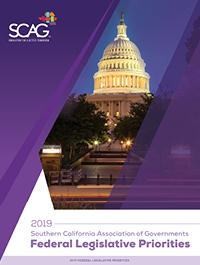
SCAG maintains a Federal and State Legislative Program, which consists of the Regional Council’s positions on policies and legislative initiatives related to SCAG’s core planning and policy areas that need the leadership and support of Congress and the California State Legislature to resolve challenges facing the SCAG region. This report summarizes SCAG’s 2019 legislative priorities around the issues of transportation, air quality, freight/goods movement, housing, environmental impact, sustainability, and economic recovery and job creation.

SCAG’s ”Mobility Go Zone Program Feasibility Study” takes a close look at how cordon pricing, and a “Go Zone” program, could be deployed to better manage traffic congestion and greenhouse gas emissions in Southern California. SCAG selected the Westside Los Angeles area for analysis as an initial proof-of-concept pilot location. This report shows that decongestion fees can have sizable impact in transportation mode choices and overall travel times by incentivizing motorists to travel at different times throughout the day.
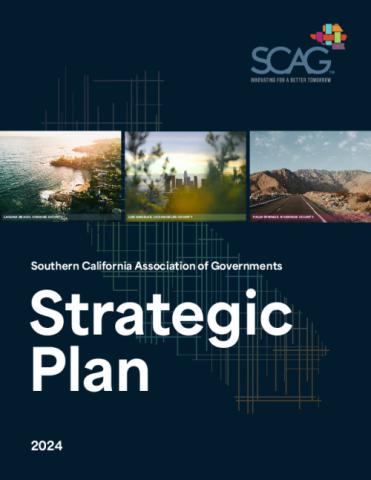
The strategic planning process originated with a comprehensive assessment of the organization. The results of this survey laid the foundation for this Strategic Plan.

The Southern California Association of Governments (SCAG) region is home to approximately 34,000 warehouses with 1.17 billion square feet of warehouse building space, and undeveloped land that could accommodate an additional 338 million square feet of new warehouse building space. The Industrial Warehousing Study is an update from previous work, which evaluates how the region could accommodate future demand for warehouse space based on key supply chain trends. Study findings were used to formulate discussion points, which will engage policy-makers, logistics industry stakeholders, and public-sector agencies about how best to shape the region’s strategic vision and grow, while balancing economic and environmental objectives.
Full Study
Final Industrial Warehousing Report – Full Study
Appendices
TASK 2 – Inventory of Warehouse Facilities
TASK 3 – Assessment of Supply Chain Strategies and Implications for Future Development
TASK 3.2 – Freight Stakeholder Interview Report
TASK 4 – Understanding Facility Operations
TASK 5 – Developing a Policy Evaluation and Framework and Assessing the Implications

The SCAG Regional Express Lane Network Regional Concept of Operations Technical Report is intended to describe how express lane facilities being implemented, planned, or proposed by the region’s county transportation commissions (CTCs) and/or California Department of Transportation (Caltrans) districts in the six-county SCAG region, referred to collectively as the regional express lane network, will operate from a user perspective and to set the framework for the design and operational characteristics of the express lane system. The report provides a blueprint for a regional express lane network that integrates individual express lane facilities into a regional system with consistent or compatible operating, design, and policy rules.
Download the SCAG Regional Express Lane Network - Regional Concept of Operations (Technical Report).
Further updates of this report is available here.

In the last ten years transit use in Southern California has fallen significantly. This report investigates that falling transit use. We define Southern California as the six counties that participate in the Southern California Association of Governments (SCAG) – Los Angeles, Orange, Riverside, San Bernardino, Ventura and Imperial. We examine patterns of transit service and patronage over time and across the region, and consider an array of explanations for falling transit use: declining transit service levels, eroding transit service quality, rising fares, falling fuel prices, the growth of Lyft and Uber, the migration of frequent transit users to outlying neighborhoods with less transit service, and rising vehicle ownership. While all of these factors probably play some role, we conclude that the most significant factor is increased motor vehicle access, particularly among low-income households that have traditionally supplied the region with its most frequent and reliable transit users.
Falling Transit Ridership: California and Southern California

Big Data and the rapid proliferation of new technologies are poised to transform and disrupt traditional policy making and planning within our local communities and across the Southern California region as a whole. Through improvements in data collection, analysis, and technology applications, governments have the opportunity to be more efficient, innovative, and transparent. To ensure that public agencies and communities in Southern California not only keep up with the pace of innovation, but lead the nation, SCAG hosted an Open Data/Big Data – Smart and Connected SCAG Region Committee (Committee) from June to November of 2017. This report provides a summary of the Committee, its work and outcomes, including a set of policy recommendations, Future Communities Framework, and a short-term work plan, Future Communities Initiative, which will implement the framework.

California’s Film and Television Tax Credit Program returned an impressive 11 percent return on investment in its first three years and helped generate $4.3 billion in economic activity and supported 22,300 jobs, according to a study released today by the Southern California Association of Governments.

The SCAG Southern California Plug-in Electric Vehicle (PEV) Readiness Plan is an in-depth assessment and planning tool that allows planners to strategically develop the infrastructure necessary to support the region’s growing numbers of electric vehicles. The PEV Readiness Plan is comprised of 15 chapters, covering everything from the basics of PEV charging, to providing technical assistance to commercial property owners and adapting zoning/building codes to streamline the installation of PEV chargers. In addition to the plan, the associated Southern California PEV Atlas provides projections of PEV growth over time in each of the 15 subregions as well as predictions of PEV daytime travel to employment and retail destinations. This information gives planners a wealth of data to support building charging infrastructure where demand will be the greatest.

On The Move represents a long-range comprehensive plan for the goods movement system in Southern California. The plan is designed to ensure that the region continues to play a vital role in the global supply chain while meeting regional economic goals, addressing critical mobility challenges, preserving the environment and contributing to community livability and quality of life goals. The plan is the final product of the SCAG’s Comprehensive Regional Goods Movement Plan and Implementation Strategy, a multi-year effort to collect data, conduct analyses and engage with regional, statewide and national stakeholders covering various aspects of the region’s goods movement system.
On the Move: Southern California Delivers the Goods (Executive Summary)

SCAG has published a new demographic analysis based on the U.S. Census Bureau’s 2024 American Community Survey (ACS) one-year estimates: “Highs, Lows, and Shocks: Key Housing and Economic Trends in Southern California.” Published during the 2025 Southern California Demographic Workshop, hosted by SCAG and the USC Sol Price School of Public Policy on Oct.


The growth and evolution of industrial facilities supporting distribution and consumption is increasingly impacting the SCAG region’s growth and changes in its urban and suburban environments. The primary purpose of this whitepaper is to identify why a regional systems-based approach to industrial development is necessary and to guide the SCAG region toward a regional systems-based approach.

This report summarizes the accomplishments of SCAG during President Art Brown’s term covering the period 2023-2024. The featured accomplishments highlight the agency’s extensive work to identify and address the needs of the region and promote sustainability, prosperity, and quality of life improvements for all Southern Californians.
Download the President's Report Year in Review 2023-2024.

Clean cities coalitions are required by the U.S. Department of Energy (DOE) to establish and maintain a strategic plan, which serves as a multi-year guideline to identify objectives and activities to achieve specific goals, including a 16 percent increase in gasoline gallon equivalent displaced and a 20 percent yearly reduction in greenhouse gas emissions.

Released in conjunction with the 14th Annual Southern California Economic Summit on Dec. 6, 2023, the 2023 “Regional Briefing Book” provides current, detailed data on the state of the Southern California economy, with breakdowns of location-specific data for Imperial County, Los Angeles County, Orange County, Riverside and San Bernardino counties, and Ventura County. The economic news in 2023 is generally good in Southern California—the region continues to avert a long-predicted recession while collectively overcoming numerous economic hurdles. There are reasons to be cautious about the economic growth of the region and its localities in the coming year, however.
View the 2023 Regional Briefing Book here.

The SCAG Clean Technology Compendium provides resources and information for local planners and other stakeholders, public or private, working to transition Southern California’s transportation sector to a new generation of clean technologies. By providing an in-depth overview of zero- and near-zero-emission transportation technologies for cars, trucks, buses, trains and bikes, along with charging and fueling infrastructure and other supporting products, the clean transportation technologies explained in the Clean Technology Compendium can immediately improve air quality and reduce the negative public health outcomes throughout the region.
Read the Clean Technology Compendium.
Read the Clean Technology Compendium Factsheet.

The Climate Equity Compendium provides resources for local planners in the SCAG region to advocate for and implement equitable and actionable solutions for their jurisdictions’ climate adaptation efforts. SCAG developed the Compendium in partnership with more than 60 local jurisdictions, focusing on the major concerns of climate adaptation for local agencies: providing resources to assist with staff and funding shortages, removing barriers to relevant data and resources and overcoming the challenges of effective, equitable outreach. SCAG will continue to update the Climate Equity Compendium as the challenges of climate equity evolve.
Read the Climate Equity Compendium

The extent of the changes brought on by the COVID-19 pandemic are still becoming clear. This report examines new data from the American Community Survey to provide insights into how demographic, economic and housing trends in Southern California have changed between 2019 and 2022—and what has stayed the same.
This report compares several topics in demographic, economic and housing conditions across the United States, California, the SCAG region, and each of its six counties. The topics include:
An Assessment of the City of Los Angeles
SCAG and California State Polytechnic University, Pomona’s Urban Planning Department collaboratively published a peer-reviewed paper in the renowned Journal of Housing and the Built Environment highlighting the Accessory Dwelling Unit (ADU) Potential project. The paper investigates the impact of Los Angeles’ ADU ordinance on property and neighborhood characteristics in relation to ADU development. Multilevel, logistic, regression models reveal that the ordinance has diversified the types and locations of ADU construction, which ultimately reduces the influence of pre-existing property characteristics. The paper suggests that the ordinance likely attracted ADU development in areas with better bus transit accessibility. These findings offer valuable insights for jurisdictions seeking to create effective policies to support ADU development.
Read the full paper.

The SCAG region includes the Port of Los Angeles and the Port of Long Beach comprising the largest port complex in the Western Hemisphere driving substantial volumes of imports and exports. The region also includes the two largest Class I railroads in North America, BNSF Railway Co. and Union Pacific Railroad Corporation, which facilitate the movement of goods for local and national consumption. Both the rail and port systems are supported by extensive intermodal facilities, freight corridors and access roads, that connect with the largest industrial warehouse and distribution cluster in the United States. At the same time, the SCAG region provides an extensive commuter passenger rail system.

This report summarizes the accomplishments of SCAG during President Jan Harnik’s term covering the period 2022-2023. The featured accomplishments highlight the agency’s extensive work to identify and address the needs of the region and promote sustainability, prosperity, and quality of life improvements for all Southern Californians.
Download the President's Report Year in Review 2022-2023.

The SCAG region has ambitious goals to reduce greenhouse gas emissions (GHG) in transportation, the number one cause of climate change, in part, by reducing single-occupancy vehicle trips and increasing transit mode share. A key step toward meeting these goals, as well as local and county goals for mobility and equity, can come from improving the speed and reliability of transit services throughout the region.
This research comprehensively examines the capacity of Accessory Dwelling Unit (ADU) development regarding ADU implementation in the Southern California Association of Governments (SCAG) region by conducting a series of analyses at the local and regional levels. This research focuses on the eligibility of parcels for developing detached ADU and excludes Junior ADU (JADU), garage conversions, and non-conforming ADUs.
View the ADU Final Report

Released in conjunction with the 13th Annual Southern California Economic Summit, held on Dec. 1, 2022, this year’s Regional Briefing Book provides an overview of the SCAG region economy today, as well as an outlook for the counties.
As 2022 draws to a close, the SCAG region, composed of Imperial, Los Angeles, Orange, Riverside, San Bernardino and Ventura Counties, is in a post-pandemic recovery, with business activity and labor markets rebooting as the COVID-19 pandemic subsides. In 2022, the SCAG region saw significant growth in employment, income, tourism, home building, infrastructure and new development. The region’s labor markets are booming, ending the year with unemployment at historical lows. However, the region, as much of the world, faces economic and political uncertainty and high inflation, with annual inflation at 7.9 percent in Southern California as of September.

The primary purpose of the Curb Space Management Study (CSMS) has been to take a comprehensive and multimodal review of congested and complicated curb space locations within the SCAG region. With a need for improved mobility, reduced congestion and vehicle miles travelled (VMT)/vehicle hours travelled (VHT), and air quality benefits such as Greenhouse Gas (GHG) emissions, and now COVID-related impacts being critical to the region and its localities, a clear need exists to assess policies, strategies, and infrastructure investments, and their impacts on curb space activity.
A First Look at Post-COVID Southern California

The COVID-19 pandemic not only impacted trends, it impacted the ability to generate data. The venerable American Community Survey’s 2020 1-year estimates were severely pared down due to sampling challenges, meaning that it was only possible to get state-level data on a limited set of topics. Until release American Community Survey’s 2020 1-year estimates, the only available Census 2020 data product is the so-called PL-94 file used for congressional redistricting, which lacks core details such as age.
This report takes a look at this newly released 2021 ACS 1-year data with an eye on economic and demographic changes observed in the SCAG region. It highlights the differences between 2019 and 2021 in order to compare pre- and post-pandemic.
Download the American Community Survey 2021 1-Year Estimates: A First Look at Post-COVID Southern California report.

The Southern California Association of Governments (SCAG) prepared its first Regional Express Lane Network Concept of Operations (ConOps) document in 2016 as part of its Express Travel Choices Study. The study featured a stakeholder-led process that identified the regional express lane network to be implemented in three tiers over a 30-year period.
The ConOps provide a blueprint for integrating individual express lane projects into a regional system by identifying a comprehensive set of issues that should be addressed as individual express lane projects advanced. Through ongoing meetings, the stakeholders vetted each of these issues to formulate a set of technical policy recommendations to serve as a framework for establishing consistent and/or compatible operating, design, and policy rules for the regional network.
Read the full SCAG Region Value Pricing— Regional Express Lane Network: Concept of Operations

As part of the metropolitan planning efforts, SCAG is conducting a Regional Dedicated Transit Lanes Study to explore the opportunities, needs, challenges, and best practices for developing a regional network of dedicated bus lanes and other transit priority treatments that would enable enhanced transit services, improve mobility, accessibility and sustainability, and advance implementation of Connect SoCal, the 2020-2045 Regional Transportation Plan/Sustainable Communities Strategy. This toolkit of potential priority treatments and supportive policies, tools, and practices, is meant to be tailored to a variety of local needs and constraints in Southern California communities.
Read the full Transit Priority Best Practices Report

Connect SoCal, the 2020-2045 Regional Transportation Plan/Sustainable Communities Strategy identified Key Connections that lie at the intersection of land use, transportation and innovation, meant to advance policy discussions and strategies to leverage new technologies and create better partnerships to increase progress on the regional goals. One of the Key Connections is shared mobility and MaaS, emphasizing that the future of travel will be shaped by technology and the ability of residents to easily choose from and use a variety of travel options.
MaaS integrates transportation services into a single mobility platform that provides competitive alternatives over private vehicles, to promote universal basic mobility, encourage mode shift, and foster sustainable travel choices. This White Paper identified the key policy issues and building blocks for MaaS, and the critical steps that will advance the region towards a truly integrated transportation system. The findings and recommendations set the stage for policy discussions for the 2024 Connect SoCal update.
Read the full MaaS Feasibility White Paper Final Report
Mobility As A Service Feasibility In The SCAG Region Storymap

